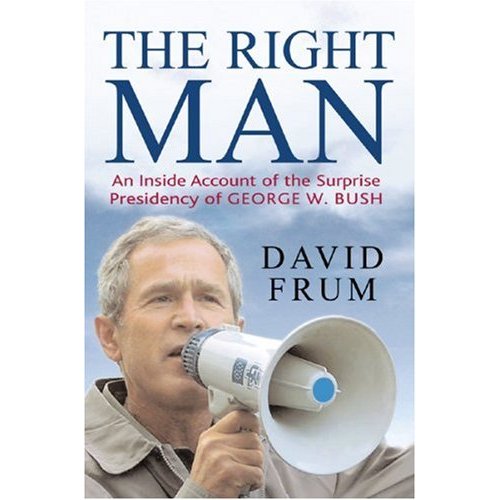It’s always fascinating to look at history and events by examining what was being said at the time. So often, most of the historical accounts and research is written with hindsight but without balancing out what the general thoughts, regardless of how varied they may be, at the moment were. My decision, in 2010, to read David Frum’s 2003 book, The Right Man: The Surprise Presidency of George W.Bush came down to two reasons. One, it was a selling for a quarter in a library bargain bin. Two, it may provide stimulating and valuable insight on the Bush presidency at that time, without the burden of the 2002-on current zeitgeist on the Bush Presidency.
David Frum was hired by the Bush Administration as an Economic Speechwriter and the book encompasses his time from early 2001 until he left in February 2002. The title of the book not so subtly declares how Frum feels about Bush as a leader. Though he’s, at times, mildly critical it’s rarely about anything substantive. In fact, Frum may be most critical about some of Bush’s speeches which Frum himself, as a speechwriter, is directly or indirectly responsible for. In sum, Frum feels that the Bush Presidency was on a meandering path nowhere until 9/11 and then Bush became the Right Man for the job as a wartime President. Frum never really critically challenges the Administration on what we now today realize were some gross misjudgments or outright lies. Granted that this was before the actual decision to invade Iraq, yet Frum (the main writer behind the “Axis of Evil” speech) assumes that there is already justification to invade Iraq and through his writing, he obviously perceived it as inevitable. That line of thought seems to have run deep in the Neo-Con cabal, and international law was just an afterthought.
The redeeming aspects of the book are the inside looks at working in the White House and, more specifically, working in the White House during and after 9/11. Frum really gives the reader a good sense regarding the two poles of the administration between with Karl Rove and Karen Hughes. He’s also adamant that there is no sinister Dick Cheney who pulls the strings, in fact, Frum paints a picture of George W. Bush as a very resolute man and not swayed once a decision has been made. Along those lines, Frum portrays Bush as one who makes bold decisions from a moral plane and is willing to stick with them regardless of political consequences. Depending on your worldview, that can be either seen as a redeeming quality of a great leader or a fault of a reckless cowboy.
Frum’s insight can be taken for what it is, the thoughts of a loyal aide who strongly believes in his former boss, at least in 2002. Has Frum changed his perspective on Bush? I don’t know but I would say that it would have to been altered in some way in the last 7 years. The value of the book isn’t necessarily what Frum thinks about Bush circa 2002, but moreso, what did people like Frum think in 2002. It’s a good overview of how the neo-con perspective was prior to Iraq. Also, Frum does do a good job at giving some insight on how the White House worked, but he was obviously not a part of any inner circle so nothing is overwhelmingly revelatory. This is part of a series of books I plan on reading about recent American Politics in an attempt to cobble several different perspectives together. The Right Man: The Surprise Presidency of George W.Bush, though a .25 cent bargain bin book and outdated by most standards, still has a voice that is worth acknowledging today.
